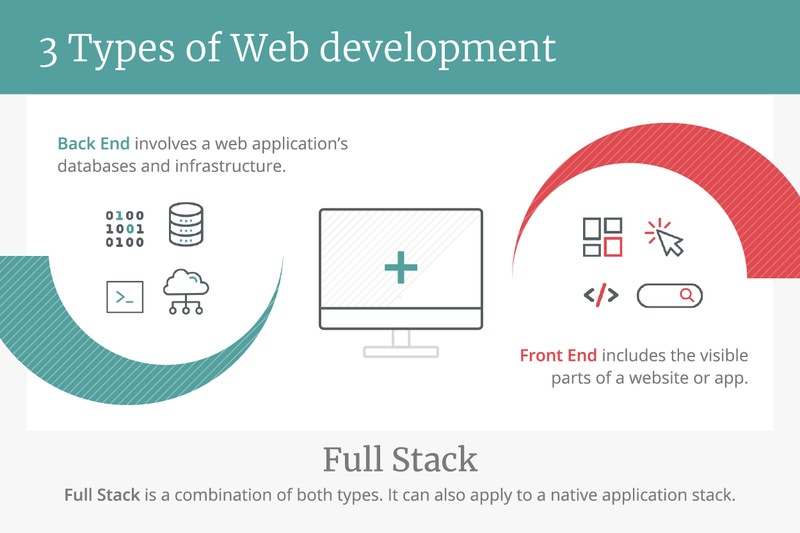Web development bootcamps are growing in popularity worldwide. A recent report forecasts a 17% compound annual growth rate for bootcamps through 2025, driven by their relatively low cost that result in relatively high entry level salaries. Not to mention a career in tech where you have the opportunity to shape the future of the tech world.
Web development bootcamps come in many shapes and sizes, and it’s important to understand if a particular bootcamp is worth it for the time and cost you’ll put in. Common questions may include, “How much will I make after graduating from a bootcamp” or “what kind of jobs will I be able to get?”
But you should also form a clear picture about the pros and cons of the bootcamp environment itself, and make sure you understand what you will be learning. Arm yourself with the full picture to ensure that you find a web development bootcamp that is right for you.
How much will I make after a coding bootcamp?
A natural first question for bootcamp students is, “How much will I make after I graduate from a coding bootcamp?” The truth is that web developer salaries can vary widely by region.

The national average salary for web developers is $72k per year* according to Indeed.com, but salaries can be significantly higher in cities like New York City ($92k per year*) or San Francisco ($124k per year*). Obviously, these cities are also more likely to have large job and talent pools than other locations.
Another factor that can affect your salary is your experience outside of the bootcamp environment. Individuals with computer science degrees, experience with multiple programming languages, or past coding jobs may find higher salary opportunities due to their skills. Likewise, individuals with deep industry knowledge in a niche area (such as the petroleum industry, financial services, etc.) may start out at a higher salary.
Are web development bootcamp grads actually getting jobs?
Many bootcamps make their hiring numbers transparent and submit them to independent third-party review.
For example, 86% of Flatiron School bootcamp graduates accepted a job offer within the reporting period of their job search.* Among job seekers who accepted (and disclosed compensation for) full-time jobs, the average starting salary was nearly $75,000 per year.**
*for job-seeking on-campus and online graduates included in the 2020 Jobs Report including full-time salaried roles, full-time contract, internship, apprenticeship, and freelance roles, and part-time roles during the reporting period (see full Jobs Report here).
** For job-seeking on-campus US student graduates who accepted full-time salaried jobs during the reporting period and disclosed their compensation. The average starting salary for US on-campus graduates who accepted full-time contract, internship, apprenticeship, or freelance roles and disclosed compensation was $33/hr. Average pay for a part-time role was $24/hr (see full Jobs Report report here).
These numbers often reflect not only the quality of a bootcamp’s educational offering, but also the additional benefits that come with the bootcamp’s services, on campus programs, etc. These can include 1:1 career coaching, resume guidance and mock interviews, direct connection with companies that are hiring, and the overall development of an online portfolio and personal brand.
A portfolio of actual work is a key element of hiring for coding jobs, and can be useful in pursuing career opportunities well past your first job out of bootcamp.
How much do web development bootcamps cost?
Another natural question is, “how much will a web development bootcamp cost?” Again, this will vary widely by bootcamps, which can range in cost of tuition from $1,300 to $30,000 or more. (The average cost in the US for a web development bootcamp is around $13,000).

When considering the cost of a bootcamp, make sure to look at the full package of benefits being offered. This will help you do an apples-to-apples comparison with other bootcamps and/or online courses. At a minimum, you’ll want to consider:
-
Overall length. A fifteen-week bootcamp can seem like a large time investment, but will leave you with a far richer range of skills (and portfolio items) than a basic camp that runs for two or three weeks.
-
Curriculum. Is the bootcamp focused on a specific tool or language, like Python, or is it offering an end-to-end look at a major area of focus, such as full-stack web development?
-
Schedule. Full-time bootcamps give you the opportunity to focus on building your web development skills in only a few months, providing you with an intense but thorough grounding in the skill areas. For those who need to work at their own pace, part-time or flexible pace bootcamps can be the better option.
-
Campus access. Does the learning environment include study spaces you can access outside of your structured learning? Does it provide networking areas to relax and enjoy time with the bootcamp students, alumni, and staff you connect with along the way?
-
Career assistance. Does the bootcamp have a history of placing people in jobs? Do they have connections with tech companies that have become reliable employers? Will they work with you to develop your personal story and guide you through a search process with mock interviews and other preparation?
Benefits like these can make more expensive bootcamps a much better value proposition in the long run. Additionally, these more established bootcamps are more likely to have the resources required to stay current with modern industry technology and hiring needs.
At Flatiron School, for example, our curriculum is reviewed by industry panels to ensure that our focus is on the most relevant skills and programming languages for web development. This is critical because the web development industry is constantly evolving as new languages, platforms, APIs, and other packages are developed.
You may also find that more intensive, full-time bootcamps offer access to experienced instructors who can provide technical support for problems you encounter during your coding, and a network of serious career-minded professionals who have made the same investment in time and effort you’ve chosen to make to advance your career.
Do companies hire bootcamp grads?
The job placement numbers earlier in this article speak volumes about whether or not companies hire bootcamp graduates. As early as 2017, Indeed.com found that 80% of companies they surveyed had hired a bootcamp graduate, and 99.8% said they would do it again.
Career Karma reports that “bootcamp grads have found employment in large companies such as Google, LinkedIn, Dropbox, Facebook, and Amazon.” But the web development hiring universe isn’t limited to these major companies.
Key job hunting/network connection portals like AngelList will often post articles breaking down some of the many companies on their platforms who proudly hire bootcamp graduates. These companies can range from major and established firms like PwC, and prominent industry players like Vimeo, down to any number of tech startups and other small businesses.

What will web development bootcamps teach you?
Now that you have answers to some of the most common questions about attending a bootcamp, let’s take a look at what you can expect to learn.
We mentioned before that some bootcamps and online courses will only touch on specific elements of web coding, such as a popular language or application. When considering a web development bootcamp, it’s critical to understand if you’ll be learning front-end development, back-end development, or both (full-stack development.)
Front-end development
Front-end web development involves the elements of the website or web application that a user experiences. For this reason, it is also known as client-side development.
The most common languages in the front-end development world are HTML, CSS, and JavaScript. These languages govern the overall web design and key elements such as interactivity.
Front-end web developers need to keep up-to-date on advancements in these languages (as well as new, emerging languages) to ensure their career skills stay relevant. You will also need to understand how a front-end environment will behave on different user devices, such as a desktop vs. a smartphone screen.
Also important? Making the website functions correctly on different browsers, such as Chrome and Safari. Not only do these browsers have different ways of displaying information, they also have different security measures, and may offer access and integration to a host of third-party applications that can affect the user experience. Ad blockers, for example.
Good design principles will also be a key element of a front-end development job.
Back-end development
The back-end of a website is the powerhouse, providing the server(s), database integrations, and other applications necessary to make the website function.
Whereas the front-end programming languages were about creating and structuring the user experience, the back-end languages will have a wide range of powers and capabilities. Chief among these will be Ruby, PHP, and Java, which in combination provide a tremendous amount of integration and flexibility.
But there will also be key decisions to make about data capabilities, such as how data is input or called, and how it connects to a company’s various systems. Needless to say, back-end developers also have to worry about a host of security issues.
They need to ensure that server and database access is authorized and can be tracked correctly; and that both the company and its end users are protected from known (and unknown) threats that can be introduced via web applications.
Full-stack development
Front-end and back-end development may seem like very different jobs, but there is an ongoing trend in the growth of ‘full-stack web developers’ meaning they do both front-end and back-end. Full-stack web developers will oversee the design, build, and maintenance of webpages and server-side applications from the ground up.
For companies, there’s a lot of upside in using full-stack developers. You can save money versus needing to split up the role, and you can also ensure that the front-end and back-end are seamlessly working together.
And because both front-end and back-end developers need to be able to work with business units to determine their needs, having a full-stack developer on a project from the start is the best possible guarantee that someone is evaluating the entire project.
Because full-stack developers know their systems better than anybody, they can also be great long-term staff to have on hand for ensuring the ongoing maintenance and necessary upgrades of the website, as well as the quick introduction of new business requirements.
What are the pros and cons of web development bootcamps?
Any serious career investment has pros and cons to consider. Web development bootcamps are no different. When deciding if a bootcamp is worth it, take a few moments to think about the pros and cons you will need to consider when making your choice.
First of all, there’s the cost. On the one hand, a professional bootcamp will cost more than taking individual courses or teaching yourself. The average cost of a bootcamp is around $13,000.
However, bootcamps were developed to get you the training and skills you need quickly. A bootcamp that lasts only a few months can represent a serious cost and time savings over the pursuit of a formal bachelor’s degree or master’s degree in computer science or a related discipline. For an entry-level career seeker, or someone seeking to make a quick career transition, this extra savings and time can represent a serious value in terms of lifestyle and income.
While some employers might prefer a four-year bachelor’s degree or two-year master’s degree, there is significant time and costs involved, which often makes it the less desirable option.
A big ‘pro’ of bootcamp is that you will learn coding skills necessary for day-to-day projects, and you will learn via hands-on portfolio projects, rather than theory based learning.
So is a web development bootcamp worth it?
The final decision on whether a web development bootcamp is the right step for you will come down to a number of factors, including your time and the amount of money you are able to invest in your career right now.
But with the relatively low cost for an intensive and immersive experience, web development bootcamps may be especially valuable options for entry-level computer web developers looking to quickly upskill and make a change in their career progress.
Regardless of your career circumstances, an intensive web development bootcamp experience may be the perfect next step. Interested to learn more about if this program is right for you? Schedule a 10-minute chat with Flatiron School admissions to learn more.
*July 2021




